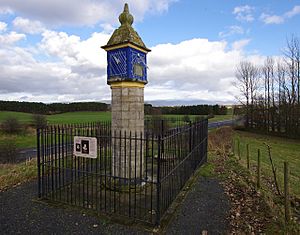Countess Pillar facts for kids
The Countess Pillar is a special stone monument from the 1600s. You can find it near Brougham, Cumbria, England. This pillar stands between the towns of Penrith and Appleby. It is about two miles east of Penrith, right by the A66 main road. The top part of the pillar is square and painted in bright colors. It even has sundials on its sides to tell the time using the sun!
A powerful woman named Lady Anne Clifford had this pillar built in 1656. She wanted it to mark a very important spot. This was the last place where she said goodbye to her mother, Margaret Clifford, Countess of Cumberland. It was a sad and memorable moment for Anne.
Contents
Why Was the Countess Pillar Built?
Lady Anne Clifford (1590–1676) was a countess with many titles. She spent much of her life trying to get back her family's lands and wealth. This was a long and difficult legal fight. Her mother, Margaret, was one of the few people who truly supported Anne's claim.
In 1616, Anne traveled north to see her family's estates. She also visited her mother at Brougham Castle. When it was time for Anne to leave the castle, her mother went with her. They walked about a quarter of a mile to where the castle path met the main road. There, they had a very emotional goodbye. Just one month later, Anne's mother, Margaret, passed away. The Countess Pillar stands as a lasting memory of this final farewell.
What Does the Pillar Say?
The Countess Pillar has words carved into it. These words describe Anne as the "Sole Heire" (only heir) of her father. Her father was George, Earl of Cumberland. The pillar also mentions a special gift given in memory of Margaret. This gift was for the poor people living in the area of Brougham. This act of kindness is remembered every year on April 2nd.
The Countess Pillar in Poems
The story of the Countess Pillar has even inspired writers. A poet named Felicia Hemans wrote a poem about it. Her poem is called "The Memorial Pillar." It tells the story of how and why this monument was built. This poem is part of her collection called Records of Woman.
See also
In Spanish: Pilar de la Condesa para niños
 | James Van Der Zee |
 | Alma Thomas |
 | Ellis Wilson |
 | Margaret Taylor-Burroughs |


